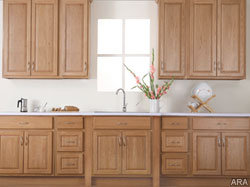
If you’re one of the many homeowners who took advantage of record low mortgage rates and the recent first-time homebuyer’s credit, you most likely are looking for plenty of do-it-yourself tips and guidelines to help you turn your new abode into a comfortable and homey place for your family.
The homebuyer’s tax credit is projected to have added 2 million first-time buyers in 2009 and another 900,000 in 2010, according to the National Association of Realtors. But there are also many long-time homeowners who, because of the state of the economy, are considering doing home improvement projects themselves in order to save money, according to the National Kitchen and Bathroom Association.
If you have a home improvement project on your list – from bathroom and hardwood kitchen cabinets to painting or putting in new floors, here are some DIY tips to get you started:
* As a DIYer, you can manage the project – no matter how big or small – on your time and according to your finances. To get your project started on the right foot, make sure you plan ahead. Establish a budget, determine your goals for the project and, depending on cost, figure out if you can do everything right away, or if you have to do the project in pieces.
* Research what you’re going to be doing. For example, if you plan to install new kitchen cabinets, visit Cabinets to Go, which sells warranty-covered, real-wood cabinets with no particleboard or veneer, and provides shipping nationwide. The site, www.cabinetstogo.com, has a virtual 3D kitchen planner, which allows you to develop a design tailored perfectly to your home. These cabinets are often sold at a 50 percent discount from prices offered by traditional retailers.
Regrets happen – 34 percent of DIYers have at least one regret stemming from a home renovation project according to a recent Consumer Reports poll. So anticipate the unexpected and research the products you’re going to be using.
* Review the blueprints of your home so you can plan around any structural issues. Check where beams and studs are located, as well as electrical boxes and water lines. Make sure your plans take into consideration the locations of these utilities. Also make sure you understand how the water lines work. Seventeen percent of bathroom remodels experience issues with water damage, mostly because homeowners start the project without knowing how the pipes work, according to Consumer Reports.
If you’re in a new home, or have decided to refresh your home’s look so you can enjoy it longer, you may determine that replacing cabinets, changing the coloring or installing new appliances is exactly what you need to make your home fit you. Transform the visual appeal of your house yourself by rolling up your sleeves and putting your personal touch on the project. And save money at the same time by not contracting it out.





